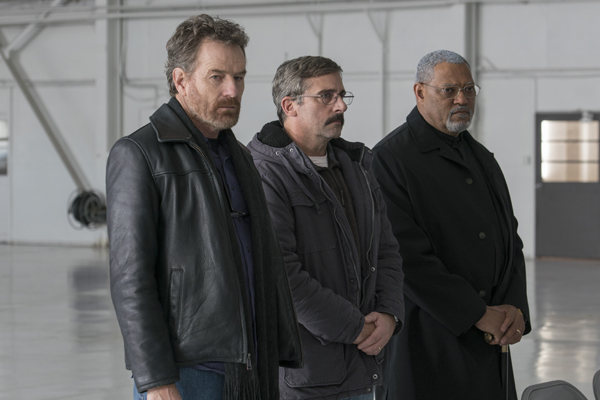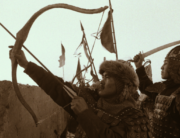Infused with nostalgia and melancholy, Richard Linklater’s Last Flag Flying is a sober look at how the battle scars of three military buddies have shaped the trajectory of their lives. Still, it’s a lightly humorous film that stars a trio of actors who need no introduction—Bryan Cranston, Steve Carell, and Laurence Fishburne.
World premiering at the 55th New York Film Festival on September 28, the film was a surprisingly sentimental choice for the highbrow festival, a weepy kickoff to the celebratory event, albeit by a beloved director. A quasi-sequel to Hal Ashby’s 1973 The Last Detail, the new film does an about-face in tone, swapping the exuberant invincibility of youth for the settling in of late middle age for the story’s three Vietnam War vets.
Over the course of his three-decade career, Linklater has often experimented with the passage of time. His last work, Everybody Wants Some!! was a spiritual sequel to his early effort Dazed and Confused. He invited Ethan Hawke and Julie Delpy back twice to continue the onscreen relationship they began in Before Sunrise over the course of nearly 20 years. Most notably, he followed a youth from ages six to 18, virtually in real-time, in his highly fêted Boyhood. His new film does not reach the quality of his best, but it is an important part of the overall oeuvre.
In Last Flag Flying, three men reunite 30 years after their tour of duty, when mild-mannered family man Larry “Doc” (Carell) recruits his two old buddies, brash, bar-owning Sal (Cranston) and pious man-of-the-cloth Mueller (Fishburne), to attend the burial of his son who was killed in Iraq. It is 2003, after the capture of Iraqi president Saddam Hussein and decades after the tragedies of a previous war culminated in two years in the brig for Doc, for petty theft; 100 percent disability for Sal, after a metal plate was put in his head from a combat-related incident; and rock bottom addiction for Mueller, before he found God.
At Dover Air Force Base in Delaware, Doc hears the shocking unofficial account of how his son died, and he forgoes a burial at Arlington Cemetery for one near his home in New Hampshire. In a road trip along the Eastern seaboard that echoes the one in the original film, the three comrades transport the casket and find laughter even in their pain. They reminisce about shenanigans with booze and hookers, come to terms with a secret that has haunted them through the years, and rediscover the essence of their friendship despite a 30-year separation. Sal insists that they buy Motorola flip phones and a family cell phone plan in a hilarious scene that leavens the mournful circumstances.
Along the way the three knock on the door of an elderly woman (Cicely Tyson) to shed light on her beloved son, who allegedly died a hero in Vietnam, and they find themselves considering the nature of truth and the ethics of honesty before the visit ends.
Much of the material adheres closely to the book. Author Darryl Ponicsan adapted his 1970 novel, The Last Detail, for Ashby with Robert Towne (screenwriter for Chinatown and many other classics), and he worked with Linklater on the screenplay for his 2005 Last Flag Flying sequel. Names, military ranks, and other details were changed to individualize the new work. Servicemen and women and those who are familiar with their world may find something special in the film, and it is a must-see for Linklater fans. Others, though, may find the tone too bleak.
Though it’s a war film, the battlefield is internal, with personal revelations, understanding, and acceptance part of the journey for the aging vets. Ultimately, the film comes off as patriotic and respectful of the military despite the ineptness and even cruelty leveled on the men, as time and experience have normalized a gamut of wartime wrongs.







Leave A Comment